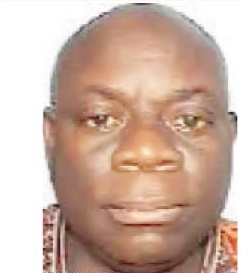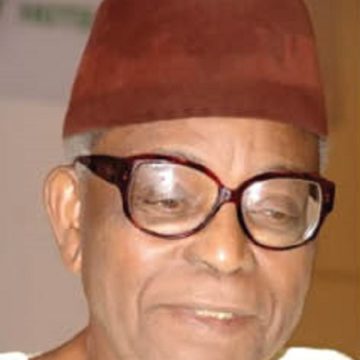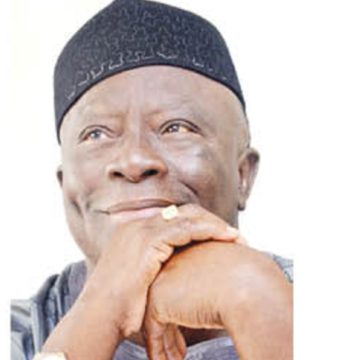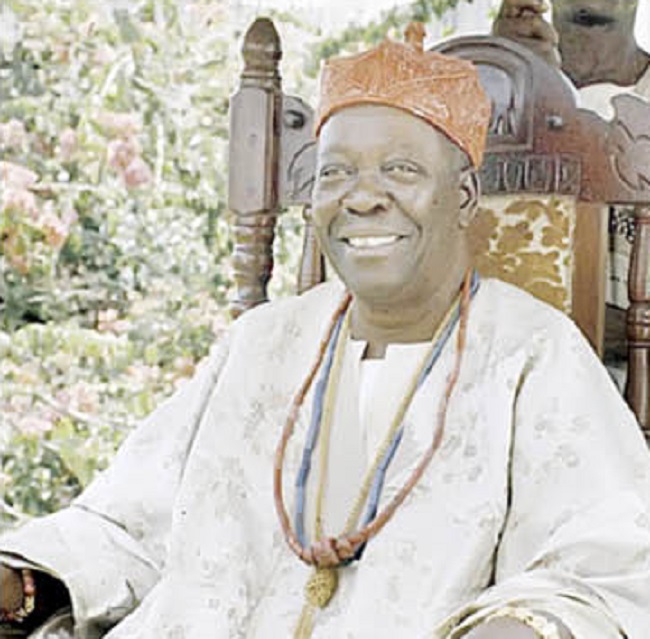Exactly 40 years ago, one of the most influential monarchs in the history of mankind, Oba (Sir) Adesoji Aderemi joined his ancestors. KUNLE ODEREMI captures the views of some senior citizens on the life and times of the late revered Ooni of Ife.
History is replete with the imprints of great men, whose marks on the sands of time remain limitless and indelible. And Nigeria is blessed with such rare breeds, whose legacies endure eternally. One of such inimitable personalities is the late monarch of the historic city of Ile-Ife, Oba (Sir) Adeyinka Adesoji Aderemi. Exactly 40 years after he joined his ancestors, his image and stature still loom large in and outside the shores of the country, having carved a niche for himself in different spheres of life and ingrained his name in the subconscious of millions across the world.
Described as a man of many parts, a colossus and legend, Oba Aderemi brought dignity, character and honour to private and public life. He dignified the traditional institution, governance and service to humanity in his 90 years of existence. From a humble beginning, the quintessential leader rose to fame through hard work, perseverance and integrity to the pinnacle of success, to the envy and chagrin of even the British colonial masters particularly because of his guts at very critical moments in stout defence of the people.
Famous for his robust debates and arguments, Oba Adesoji was admired, revered and celebrated for being able to strike a deliberate balance between African tradition and modernity. Highly principled leader with finesse, the monarch was one leader that bestrode political space and the royal institution, especially in the dogged battle against Nigeria’s colonial warlords. In recognition of his excellent character, Spartan life style and patriotism, Oba Aderemi served in the highest organs of government from the colonial era to pre-and post-independent Nigeria. From being a minister in the cabinet under the MacPherson Constitution to becoming a governor general in the defunct Western Region, he was involved in all constitutional conferences that led to the attainment of independence by Nigeria in 1960.
Oba Adesoji, whose sphere of influence in the public space remains apparently unprecedented, took a glorious bow from the mother earth to the terrestrial plane on July 3, 1980 after an eventful 50-year reign as the Ooni of Ife. His exit shook the mortally world to its foundation, eliciting torrents of tributes from the high to the low. Born in Ile-Ife to the family of Osundeyi Gbadebo and Adekunbi Itiola, the monarch lost his father when he was just eight years old, thus his upbring fell on the shoulders of his mother.
Aderemi, who was chosen as the Ooni in September 1930, was among the pioneer students in 1901 at St Phillips School, Ife. He facilitated the founding of the famous Oduduwa College, Ife and two feeder primary schools. Realizing the importance of formal education, the monarch was resolute in his quest to create access to higher education by the citizens. His effort paid off a few years after Nigeria gained independence; he ensured that the University of Ife (Obafemi Awolowo University) was located in Ife.
As a nationalist, he towered above his peers in the battle to secure Nigeria’s freedom from the colonialists and in fact he was a torn in the flesh of the British colonial masters, especially following a motion for self-autonomy by 1956 moved by Chief Anthony Enahoro under the Action Group (AG), led Chief Obafemi Awolowo. He, along with another nationalist and monarch, the Alake of Egba land, Oba Ademola were firm and resolute on a motion calling for self-determination, despite efforts by the colonial officer in charge of affairs then, the late Sir John Macpherson to prevail on them since they wanted freedom for their people. Though the process of Nigeria securing independence was delayed, due to the ambivalence of elements of the then Northern Peoples Congress (NPC), the Action Group and the National Council of Nigeria and the Cameroons (NCNC) members staged a walk-out of the House of Representatives, with Oba Aderemi and Oba Ademola. The Ooni went further to tender his resignation from the Council of Ministers at the Government House. His place in the history of Nigeria’s tortuous road to independence is indeed incomplete without a detailed account of his crucial role and inputs. Oba Adesoji was pivotal as a member of all the Constitutional Conferences that midwifed the Macpherson Constitution in 1952 and the Independence Constitution in 1960. One other remarkable about his leadership style was that those incredible feats were achieved without resort to any act of violence.
Below are the views of some senior citizens on the attributes, legacy and of this irrepressible, enigmatic and charismatic monarch, who gave all he had for the benefit and progress of the human race.
I wished we could have more of his type now — Ayo Adebanjo
Oba Adesoji Aderemi was a monarch of a remarkable reign; a nationalist and patriot. He was one of the pillars of the Action Group (AG) and one of the fighters and relentless advocates for the establishment of federalism in Nigeria. And when the AG took up the gauntlet to press for the change of the Macpherson Constitution by the motion for independence moved by Anthony Enahoro, he was one the members of the Macpherson cabinet that was ready to hold tenaciously to the motion and he resigned from the cabinet because Macpherson refused any member of the cabinet to take part in the motion for independence. He is an oba the Yoruba land can never forget. He is an oba whom I wished we have more of him these days. He was an oba, who would have played a significant role during this period. He was a wonderful oba, a philanthropist, very accommodating and he combined tradition with modernity in his obaship.
The lesson of his life and times is for everybody to be patriotic and committed in the reign of their subjects. He was very meticulous about tradition and when you talk about the wonderful place of Chief Obafemi Awolowo’s regime, you can never forget Oba Aderemi. He was a pillar of support along with the late Alake of Egba Land, Oba Ladapo Ademola. Their type is very rare these days. I only wished more of them could emerge from our traditional rulers.

Adesoji not kind of leaders we have now —Chief Niyi Adegbenro
Oba Adesoji Aderemi stood for the truth. He was the Governor General of the old Western Region and during the crisis in 1962, he was the one who sworn in my father as the Premier of the old Western Region.
The late Oba Aderemi and my late father, Chief D S Adegbenro, were so close, although he was older than my father. He sworn in my father as the Premier of the Western Region after the removal of the Late Samuel Ladoke Akintola, and this resulted into a lot of legal tussles.
My late father won the case after the Head of Government at the centre then Sir Tafawa Balewa as they were supporting Akintola against Awolowo. So, Oba Aderemi was a good leader, not the kind of leaders we have nowadays.
What he told me at last moment —Professor Adesiyan Olawoyin
Indeed, Baba Aderemi was my great uncle and we were really close. My maternal grandfather was the immediate senior brother of Baba Aderemi, Chief Samuel Adewuyi. I think there were four or five of them; you have Adeyemo, the eldest of them; followed by a lady, followed by Baba Adewuyi; then Baba Aderemi. He was the youngest of their mother’s children and incidentally, my mother lived with him when she was young. And in actual fact, that more or less impacted on our relationship, that is, my own relationship with Baba Aderemi because when I grew up, he just took me as one of his confidants because I was like a grandchild to him. We were particularly close and there is no doubt that he impacted positively not only on the immediate community in Ife but the country at large. He was a colossus in his own right.
Some people may say, perhaps, I’m a bit prejudice because we are a blood relation. No! The facts speak for themselves. He did so many things, not only for his immediate environment but for the larger space and I believe that his memories will remain indelible. When I say the larger space, you know he was involved in public affairs in the country and in my own opinion, he acquitted himself creditably, in spite of the challenges he faced when he was the governor of the then Western Region. He approached the whole thing with dignity and a decent voice that should attract the admiration of any objective person. He was an epitome of success; he was always golden for that. I believe the average person would agree that he fought a good fight and by the grace of God, one can justifiably say that he won the race.
In summary, on his legacy, Baba Aderemi was a man who taught integrity in public affair. He was a man, who gave much credence to traditional institutions. He was a man, who would not brook, if I may use the word, lethargy; he was always active, even to the end. I recall that before he died, he called me and said he was going to give me an outline of Yoruba history with focus on Ife. In fact, we were in the process of starting the project when God called him home. Even at the age of 90, when he died, he remained active. He was an enigma in many ways. He happened to be somebody whose general character traits, like any other person, he had his own imperfections, are worthy of emulation. If we had people like him around now, perhaps, things would have been a lot better for us in this country. He knew when to be aggressive; and he knew when to step back a bit, and that, if I may say, is a mark of wisdom because there are occasions when wisdom will dictate that even though it is something you could decide to fight for, you should just step back, knowing fully well that a greater victory awaits you. He was a master in that kind of approach to life.

Untold stories about the monarch —Prince Gboyega Aderemi
He was a man of many parts. He was a traditional ruler, an astute administrator and bridge-builder. He was a frontline nationalist. He played a very prominent role in Nigeria’s march towards independence in 1960. After the collapse of imperialism, years after the Second World War when all the colonial structures were being dismantled, there was agitation for self-determination and independence in the colonial territories, in Nigeria, he played a very prominent role with the very early titans of that era like Chief Obafemi Awolowo and others that demanded independence from the British government. He was a member of all the Constitutional Conferences which ushered in the Macpherson Constitution, on the one hand and the independence Constitution, on the other. He was also a member of the House of Representatives between 1952 and 1953. He was in the Macpherson cabinet of 1952. So, he was a minister until 1953 when he resigned because when Chief Anthony Enahoro moved the motion for Nigeria’s Independence, and northern politicians began to play politics with it; that they were not going to be ready for self-autonomy in 1956. Oba Aderemi was the first to resign his appointment as a minister and the other obas and others from the Western Region followed suit: Bode Thomas and the rest of them. The consul-general tried to lure Oba Aderemi back to the cabinet but he stood firm with the people of the Western Region. So, he played that role stoutly..
Oba Aderemi was highly principled. Even Chief Awolowo believed that when Baba Aderemi gave him words concerning any matter, he could afford to go to bed because you have to convince him and robustly when you engage him. Chief Awolowo said that when he first met Oba Aderemi in 1937, it was like a father-son relationship, but it later blossomed into what it was. So, he was very fond of Chief Awolowo. Till his dying days, he was committed to the cause of Chief Awolowo. In fact, the 1979 presidential election was one of the biggest disappointments in the life of Oba Aderemi because Chief Awolowo was allowed to govern the country. He could have his lunch; h was completely downcast; that Chief Awolowo lost again; that Chief Awolowo would not be the president of Nigeria. So, he played key roles in pre-and post- independent Nigeria.
When the House of Chiefs was established, he was the first president and remained the president until he was appointed the Governor-General of Western Nigeria in July 1960. He was the first African governor-general in the British Empire. But at the same time, he played his role as the Ooni of Ife. That was why I said he was a man of many parts. From Monday to Friday, he was in Ibadan, the capital of Western Region and at weekend, he travelled to ife to see his people and cater for their wellbeing. When he became the Ooni in 1930, ife was more or less a historic relic. It had a name and everybody knew where the name Oduduwa came from. So, he took two major measures to raise the standard and accentuate the historic town. The current culture of environmental sanitation that the country is trying to inculcate in the people, Oba Aderemi started it in 1930. When he discovered the unhygienic environment in ife, the first thing he did was to clean up the environment because he beli3ved that health was wealth. So, as early as 6am every day, he would go the individual compounds called Agbo-Ile, and he would go to the compound considered as the dirtiest, call for a chair, so when the people woke up only to find the Ooni sitting in their compound, every member would rush to clean up the environment. That was how he was able to satise and enforce a clean environment.

On education, he knew that the people needed to be educated. Two years after he became the Ooni, he decided to set up Oduduwa College Ife. The Resident Officer of Oyo Province at that time tried to discourage him; the colonial officer told him that if Oba Aderemi empowered his people, they were going to turn against him at some points in the future. But Baba Aderemi disagreed. He said education was going to be the key that would use to emancipate his people from the tyranny of poverty. He said that education was the key to their prosperity in the future. So, he set up the college. Besides, he set up two feeder primary schools to ensure that there was seamless and consistent flow of students into the college: Ife central and Origbo central. So, he was a very meticulous and detailed person. And when the government of the Western Region decided to have a university, he asked that it be sited in Ife. Chief Awolowo had already promised him that it will be located in the town. By the time the project was to come up, Baba Awolowo had moved to Lagos as the Leader of Opposition at the federal level, while Chief Ladoke Akintola was the premier in the Western Region. So, some parties were beginning to play politics with the issue; they raised issue why it be located in Ife since Baba Aderemi was already governor. He said he would resign as governor, as he wanted the university to be sited in ife since he needed it in his domain. In Ife, they call him agbe orun gbo’fe because of the university and everybody knows that the biggest legacy of Baba Aderemi today is the University of Ife now called Obafemi Awolowo University. When they were playing politics with the issue, Baba Awolowo called Chief Akintola that Baba Aderemi was already on his way to Ife; that he said he was going to resign. So, the premier rushed to his office to reassure Baba Aderemi that the university would be sited in Ife as earlier planned. So, he donated about 13 hectares of family land, though he later compensated all the other members of the families.
Baba Aderemi was also a family man. My father was his first son. I am a grandson but when my father died, I was just eight years old. Baba Aderemi raised me like his own son; for 17 years after my father died, he personally raised me. In politics, he was a bridge-builder; he was consensus person. Babaremi will argue and debate robustly before taking a decision. He did not believe in acrimony. He was a man of peace; he didn’t believe in violence. For his 50 years as the Ooni of Ife, there was not one incident of violence, especially with our neighbours. He put premium on education; that without education, none could get far. He loved Ife and his children. So, 40 years, we still talk so fondly about him, not just the children even outsiders when they hear you are from the family, they say those were kings; they start telling you stories that you didn’t even know about his achievements and vision as a leader; how he shaped their lives for good. His legacy, in a nutshell, will be that he came, he saw, left a footprint and legacy that will endure for many generations.
YOU SHOULD NOT MISS THESE HEADLINES FROM NIGERIAN TRIBUNE
Court Threatens To Revoke Shehu Sani’s Bail
The Federal High Court, Abuja, Monday, said it would revoke the bail granted Senator Shehu Sani if he fails to appear in court on the next adjourned date for the trial of the two-count criminal charges preferred against him by the
Economic and Financial Crimes Commission… Read Full Story
Buhari Appoints New Chief Personal Security Officer
President Muhammadu Buhari has approved the appointment of Deputy Commissioner of Police (DCP), Aliyu Abubakar Musa, as his Chief Personal Security Officer (CPSO). He replaces Commissioner of Police (CP) Abdulkarim Dauda, who was recently redeployed… Read Full Story
APC: Buni-Led Caretaker Committee Promises True Reconciliation
As part of measure to make progress on its mandate in reconciling all factions in the ruling All Progressives Congress, the Governor Mai Mala Buni-led committee has promised to embark on genuine reconciliation of all party leaders and members ahead of the planned convention… Read Full Story
NITDA Can Finance Nigeria’s Annual Budget ―Reps Public Account
The House of Representatives says the National Information Technology Development Agency (NITDA) has the wherewithal to finance the country’s annual budget if given the necessary environment… Read Full Story
No Fee Is Charged For NIS Recruitment ― CG
The Nigeria Immigration Service (NIS) has warned applicants against patronising fake recruitment sites as no fee was charged for NIS recruitment. The Comptroller General, NIS, Mr Muhammad Babandede, gave the warning in a statement by the Service Public Relations Officer (SPEO), Mr Sunday James… Read Full Story
Inside Ibadan Slums Where Water Scarcity, Open Defecation Thwart Efforts At Ending COVID-19 Pandemic
Ibadan, Nigeria’s third most populous city, wears rusted zinc-roof like a royal hat. Weak bricks, cracked and patchy walls are strewn all about the outskirts of the city. The waft of open sewage soaks the air… Read Full Story
Buhari To Perform Virtual Flag-Off Of Ajaokuta-Kaduna-Kano Gas Pipeline Tuesday
President Muhammadu Buhari will on Tuesday, conduct a virtual flag-off of the 614km Ajaokuta-Kaduna-Kano Gas Pipeline construction project, the Nigerian National Petroleum Corporation (NNPC) has said… Read Full Story
Whistleblower Allegation Of $1bn In Unity Bank Account False ― NPA
The Nigerian Ports Authority (NPA) has refuted claims that it has an account containing $1bn in Unity Bank Plc. In a statement signed by the General Manager, Corporate and Strategic Communications of the NPA, Jatto Adams, the agency said that the account number being peddled in public glare by the whistleblower… Read Full Story
COVID-19: Over 2 Million Transport Workers In Critical Condition —Wabba
The President, Nigeria Labour Congress (NLC), Comrade Ayuba Wabba, has cried out that over two million of the congress affiliate members in the road transport sector are worst hit by the effect of the COVID-19 lockdown; and are in critical condition, dying in silence… Read Full Story
EDITORIAL: The Demolition Of Nigeria’s High Commission In Ghana
A Ghanaian citizen recently attacked the Nigerian High Commission in the country, demolishing a part of it. Expectedly, the action caused ripples in the diplomatic circles, with some observers wondering what such an action portended for the relationship between Nigeria and Ghana, which was until then presumably chummy… Read Full Story
Ending The Cable Tv Profiteering
It was like a movie, watching the proceedings of the Ad Hoc Committee set up by the House of Representatives, to probe the hike of subscription rates by cable television service providers. The Chairman of the said Committee, Hon Unyime Idem, took me back to my Aluta days at Obafemi Awolowo University… Read Full Story




